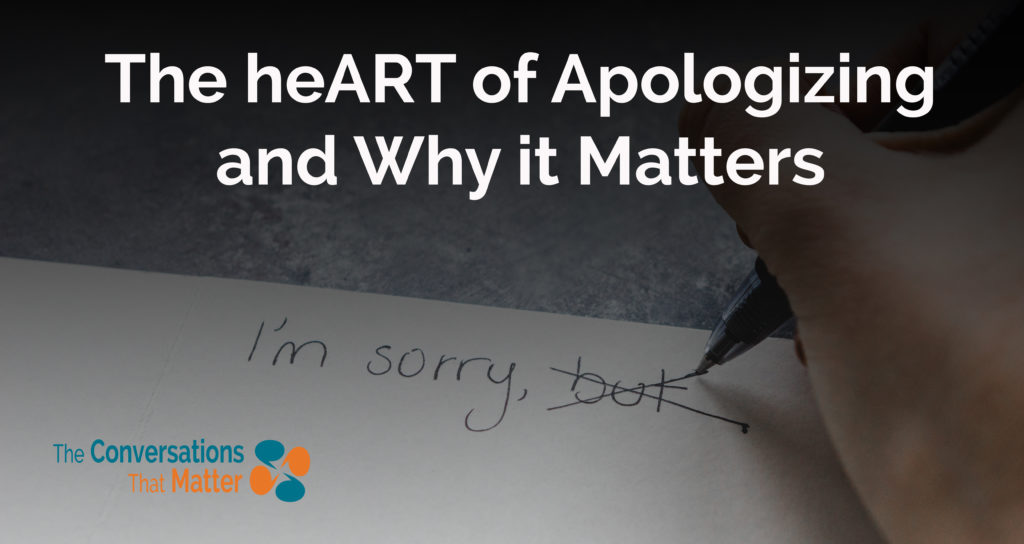
The heART of Apologizing
It’s one of those things that every human has been on the giving and receiving end of — at least I hope that’s true. An apology typically comes at the end of an event. Sometimes that event is a disagreement. Other times it is the response to a series of events that has caused harm to another person.
Regardless of why, giving and receiving apologies is not something that many people look forward to. It hits you in the gut when it forces you to work through real human feelings, and it is oftentimes awkward because you aren’t accustomed to being vulnerable in this way.
The thing about apologizing is that you can’t control what the other person says or how they react. It’s one of the big reasons apologies are so nerve-wracking. It doesn’t matter if you are giving or receiving — the same anxiousness occurs. What if you say the wrong thing or your words aren’t understood the way you want them to be? What if they don’t react the way you want? The truth is you can’t control another person’s reaction.
These fears are the reason that we often avoid apologizing altogether. Frankly – the risk is just not worth the reward. But, I won’t let that stop me or us. It’s time to act like the adults we are and step up. It’s time to take responsibility for our words and actions and risk our own ill-conceived notions about ourselves and others by doing the right thing.
Your lack of apology is not a sign of strength. It’s a sign of weakness. Guy Winch says, “People who cannot apologize often have such deep feelings of low self-worth that their fragile egos cannot absorb the blow of admitting they were wrong.”
Even though apologizing is hard, it is a necessary part of life. If you hope to do life well, this is something you need to get good at.
Why Does it Matter
Consider this. Every interaction that each of us has with another person either builds or erodes trust. Wow. That’s a lot of responsibility.
An apology has the power to do so in big ways. Sure – you can only control your words, actions and the heart with which you approach the discussion, but that’s a huge first step in building trust through an apology.
When you act with integrity, vulnerability, and authenticity, it often elicits an equal response. In the cases that it doesn’t, you’ve still done the right thing.
Apologizing Well is Both Art and Science.
Art – individuals with higher emotional intelligence understand that to create and maintain good relationships, we need to adapt our communications styles to accommodate whomever we are communicating with. We teach this all the time with our Everything DiSC toolkit. When we stop to acknowledge the other person’s pace of thinking/communicating/working, along with the perceived value they place on experiences/processes/people, we can shift our own style to honor their perspective. Let’s be clear – it isn’t about manipulating. It’s about honoring!
Science – like most things these days, a good apology can follow any number of frameworks. Jahan Kalantar, an attorney that helps criminals shape apologies, shares the following formula.
Step 1: WHY (I’m sorry that…)
Step 2: BECAUSE (because I know you…)
Step 3: AND (this will be different in the future)
Example: Tammy – I’m sorry that I missed our call yesterday. I know that your schedule is busy and my forgetfulness causes an unnecessary shift for you. Next time, I’ll be sure to come prepared and not let anything get in the way of our time together.
Practice Makes Perfect – JUST KIDDING….Apologizing is never perfect
Grace — It’s a church word that means so very much to me. I hope that it means something to you too. Grace is a gift that you can both give and receive. Because it’s not wrapped up with a bow, it can be hard to see and understand.
Grace is that moment when you know you can full-on lecture your child for leaving their dirty dishes out again, but choose to give them a hug and say “Hey kid – you’ve had a busy day. You must be tired.” It’s the moment when a coworker catches you after a meeting and says, without any malice, “listen, I know that conversation was hard for you and I want to honor the work that you put in. Next time, will you loop me in before the meeting, so I’m not caught off guard.”
I find that when I’m frustrated or angry, my self-righteousness is often tempered by my memories of the times that others offered me grace. In those moments, knowing that I had done something wrong but received grace instead of the tongue lashing I probably deserved, I learned more and my trust in the other person grew.
I’m not suggesting that grace makes apologizing unnecessary. I’m saying grace makes apologizing easier. We can all benefit from giving and receiving grace!
The Apology Formula
Next time you need to give or receive an apology, consider the following formula:
1. ART – how can I approach the other person honoring their communication style and what they need to hear to know they are heard and understood?
2. SCIENCE – what are the words I can say that will resonate, honor and respect both of us?
3. GRACE – how can I offer grace & room for growth?
